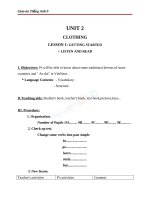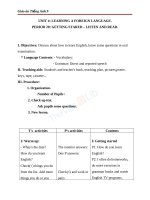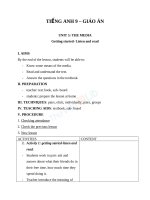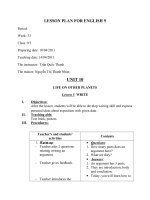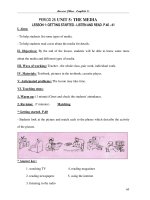Giáo án tiếng Anh 9, Unit 9 - Language focus
Bạn đang xem bản rút gọn của tài liệu. Xem và tải ngay bản đầy đủ của tài liệu tại đây (118.5 KB, 5 trang )
LESSON PLAN FOR ENGLISH 9
Period:
Week: 32
Class: 9A3
Preparing date: 31/03/2011
Teaching date: 07/04/2011
Teacher: Nguyễn Thị Thanh Nhàn
UINT 9
NATURAL DISASTERS
Lesson: LANGUAGE FOCUS
I. Objectives:
- After the lesson, students will be able to distinguish between defining relative
clauses and non-defining relative clauses.
II. Teaching aids:
Textbook, posters.
III. Procedures:
Teacher’s and students’ activities Contents
1. Warm up:
- Teacher gives a chart on the
board and asks students to fill
WHO, WHICH, THAT in the
chart.
- Teacher calls on 5 students to
write the answers on the board.
- Teacher gives the keys.
• Sentences:
1. The woman________lives next door
is a journalist.
2. A dictionary is a book ______is useful
for students.
3. The inventor _______invents
Microsoft software is Bill Gate.
4. Joe works for a company ______
produces instant food.
5. My garden has a lot of flowers
________ are grown by my older
sister.
• Answer keys:
1. Who
2. Which
2. Presentation:
- Teacher explains defining
relative clauses to students.
- Teacher explains non-defining
relative clauses to students.
3. Practice:
a) Task 1:
- Teachers asks students to use the
given words and their answers to
rewrite sentences using “who”,
“which”, “that”.
- Teachers asks students to read
their answers loudly.
- Teacher gives the keys.
3. Who
4. That
5. Which
• Defining relative clauses:
These clauses tell us which person or
thing the speaker means.
Ex: The woman who lives next door is
a journalist.
• Non-defining relative clauses:
These clauses give more information
about a person or thing already
identified.
When we write these clause, we use
“comma (,)” at the beginning and at
the end of the clauses.
In non-defining relative clauses we
cannot use “that”. We cannot also
leave out “which or who”.
Non-defining relative clauses are used
in sentences containing proper
name/noun; possessive adjectives (my,
his, her, our, their, its) and
demonstrative pronouns (this, that,
these, those).
Ex
1
: John, who speaks French and
Italia, works as a tour guide.
Ex
2
: Dick told me about his new job,
which he’s enjoying very much.
• Answer keys:
1. The country which won the 1998
Tiger Cup is Singapore.
2. The animal which has one or two
horns on its snout is rhinoceros.
3. The explorer who discovered America
is Christopher Columbus.
4. The planet which is closest to the
Earth is Venus.
b) Task 2:
- Teacher asks students to match
each of the sentences in column
A with a related sentence in
column B. Then use a suitable
relative pronoun to join the two
sentences.
- Teacher asks students to read
their answers loudly.
- Teacher gives the answers.
5. The animal which was chosen to be
the logo of Sea Game 2003 is the
buffalo.
6. The ASEAN country is divided into
two regions by the sea is Malaysia.
7. The food which you can chew but you
cannot swallow is the chewing gum
and the thing you can swallow but you
cannot chew is water.
• Answer keys:
1. E. (example)
2. G. It snowed in Lang Son, which
is on the Ky Cung River, in the
winter of 2002.
3. F. Pompeii, which is an ancient
city of Italy, was completely
destroyed in A.D 79 by an
eruption of Mount Vesuvius.
4. A. Hurricane Andrew, which
swept through southern Florida in
August 1992, killed 41 people and
made more than 200 000
homeless.
5. C. The cyclone of November 1970
in Bangladesh, which killed about
500 000 people, was one of the
worst natural disasters of the 20
th
century.
6. D. The most disastrous earthquake
in Japanese history, which
occurred in 1923, damaged Tokyo
and Yokohama and killed about
150 000 people.
7. B. The October 1989 Loma Prieta
earthquake, which measured 7.1
c) Task 3:
- Teacher asks students to
underline the relative clause in
the sentence. Then add commas
to seperate the non-defining
relative clause from the rest of
the sentence.
- Teacher asks students to write
their answers on the board.
- Teacher gives the keys.
d) Task 4:
- Teacher asks students to rewrite
the sentences in exercise 3 by
replacing each underlined clause
with a clause they have written.
- Teacher suggests the answers for
students.
- Teacher calls on some students
to read their answers loudly.
on the Richter scale, caused
extensive damage to older
buildings in San Francisco Bay
area.
• Answer keys:
1. Done as an example.
2. Kangaroos, which come from
Australia, have long tails.
3. Ba, who lives on Trang Tien
Street, likes playing the guitar.
4. Defining RCl.
5. Neil Amstrong, who first walked
on the moon, lived in the USA.
6. Defining RCl.
7. Miss Lien, who sings very well, is
my English teacher.
• Teacher’s suggestions:
1. Done as an example.
2. Ba , who lives on Trang Tien
Street, likes playing the guitar.
Ba, who likes playing the guitar, is a
good student.
Do similarly for the rest of the
sentences.
• Sentences:
1. A building, which was destroyed in
4. Production:
- Teacher gives students some
sentences containing relative
clauses. Among them there are
wrong ones.
- Teacher asks students to find out
which ones are wrong and
correct them.
- Teacher asks students to write
the answers on the board.
- Teacher gives the keys.
the fire, is rebuilt now.
2. A waitress which served us was very
impolite and impatient.
3. The girl who was injured in the
accident is now in hospital.
4. Michael who is singing is my friend.
5. Her dress which she is wearing is very
expensive.
• Answer keys:
1. W -> A building which was
destroyed in the fire is rebuilt now.
2. W -> A waitress who serves us
was very impolite and impatient.
3. R
4. W -> Michael, who is singing, is
my friend.
5. W -> Her dress, which she is
wearing, is very expensive.
IV. Homework:
- Teacher asks students to write the 4 exercises into their notebooks and make 5
sentences using relative pronoun.
- Teacher asks students to prepare Unit 10 (getting started – listen and read).

